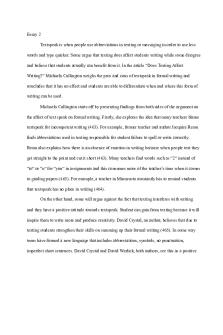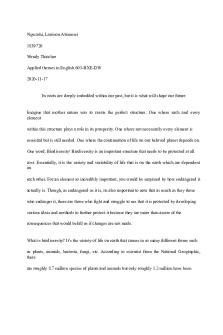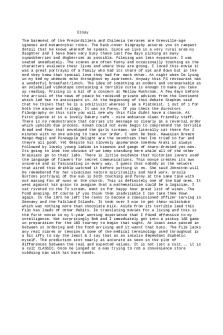Essay 2 - work PDF

| Title | Essay 2 - work |
|---|---|
| Course | Composition Ii |
| Institution | Southern Connecticut State University |
| Pages | 3 |
| File Size | 50.8 KB |
| File Type | |
| Total Downloads | 95 |
| Total Views | 145 |
Summary
work...
Description
Essay 2 Textspeak is when people use abbreviations in texting or messaging in order to use less words and type quicker. Some argue that texting does affect students writing while some disagree and believe that students actually can benefit from it. In the article “Does Texting Affect Writing?” Michaela Cullington weighs the pros and cons of textspeak in formal writing and concludes that it has no effect and students are able to differentiate when and where this form of writing can be used. Michaela Cullington starts off by presenting findings from both sides of the argument on the affect of text speak on formal writing. Firstly, she explores the idea that many teachers blame textspeak for incompetent writing (463). For example, former teacher and author Jacquire Ream finds abbreviations used in texting responsible for student failure to spell or write correctly. Ream also explains how there is an absence of emotion in writing because when people text they get straight to the point and cut it short (463). Many teachers find words such as “2” instead of “to” or “u” for “you” in assignments and this consumes more of the teacher’s time when it comes to grading papers (463). For example, a teacher in Minnesota constantly has to remind students that textspeak has no place in writing (464). On the other hand, some will argue against the fact that texting interferes with writing and they have a positive attitude towards textspeak. Student can gain from texting because it will inspire them to write more and produce creativity. David Crystal, an author, believes that due to texting students strengthen their skills on summing up their formal writing (465). In some way teens have formed a new language that includes abbreviations, symbols, no punctuation, imperfect short sentences. David Crystal and David Warlick, both authors, see this as a positive
and creative thing. In fact, Warlick proposes students should receive credit for this creation (466). Cullington concludes through her own research that students know when it’s appropriate to use text speak and limit this to areas outside of formal writing. Cullington started off by questioning students and teachers about their thoughts on the interference of textspeak in formal writing (467). From her research she indicated that texting only has a very small amount of effect on writing (468). Students know to use textspeak when they are communicating with their friends and know that there is no place for textspeak in formal writing (469). For example, one student realizes that sometimes in her writing assignments she uses abbreviations, however, she corrects them as soon as she spots them (469). Either way there is no conclusive evidence to textspeak having a positive or negative affect. Although there is little evidence that texting changes student writing there is a fair amount of complaints about it. There have been multiple complaints by teachers that students are not using punctuation, such as commas or capital letters, in their writings because when texting punctuation is unnecessary (464). Unlike like these teachers Shirley Holm, a high school teacher, has a different attitude about texting. Holm explains how when teens text they are constantly writing and since they take pleasure in texting maybe this can lead them to be fond of writing (466). This way texting would be beneficial to the student by helping them improve their writing. In conclusion, from the evidence and her research, Michaela Cullington reports that texting does not inhibit students in a negative or positive way when they write formally. She shows evidence for both point of views but supports that texting does not affect formal writing. Cullington herself says that she is always texting and when it comes to her formal writing she knows not to use abbreviations or textspeak because she is aware that it is not appropriate (470).
Cullington shows definite evidence to the fact that texting doesn’t affect writing so that people don’t assume or judge from their biased experiences.
Work Cited Cullington, Michaela “Does Texting Affect Writing.” They Say I Say, 4th ed., Norton & Company, 2018, pp. 462-473....
Similar Free PDFs

Essay 2 - work
- 3 Pages

Essay 3 - work
- 3 Pages

Essay 39 - goodf work
- 2 Pages

Essay social work methods
- 18 Pages

Resit Course-work essay
- 4 Pages

Essay 1 - work
- 3 Pages

Analytical Essay - course work
- 4 Pages

work based learning essay 1
- 16 Pages

English Work Assignment 2
- 1 Pages

HOME WORK 2
- 1 Pages

HW 2 - Home Work
- 7 Pages

Microlab 2 - lab work
- 5 Pages

Wk 2 Tutorial Work
- 9 Pages

Tutorial work - 2
- 7 Pages

Tutorial work - mechanics 2
- 2 Pages
Popular Institutions
- Tinajero National High School - Annex
- Politeknik Caltex Riau
- Yokohama City University
- SGT University
- University of Al-Qadisiyah
- Divine Word College of Vigan
- Techniek College Rotterdam
- Universidade de Santiago
- Universiti Teknologi MARA Cawangan Johor Kampus Pasir Gudang
- Poltekkes Kemenkes Yogyakarta
- Baguio City National High School
- Colegio san marcos
- preparatoria uno
- Centro de Bachillerato Tecnológico Industrial y de Servicios No. 107
- Dalian Maritime University
- Quang Trung Secondary School
- Colegio Tecnológico en Informática
- Corporación Regional de Educación Superior
- Grupo CEDVA
- Dar Al Uloom University
- Centro de Estudios Preuniversitarios de la Universidad Nacional de Ingeniería
- 上智大学
- Aakash International School, Nuna Majara
- San Felipe Neri Catholic School
- Kang Chiao International School - New Taipei City
- Misamis Occidental National High School
- Institución Educativa Escuela Normal Juan Ladrilleros
- Kolehiyo ng Pantukan
- Batanes State College
- Instituto Continental
- Sekolah Menengah Kejuruan Kesehatan Kaltara (Tarakan)
- Colegio de La Inmaculada Concepcion - Cebu
